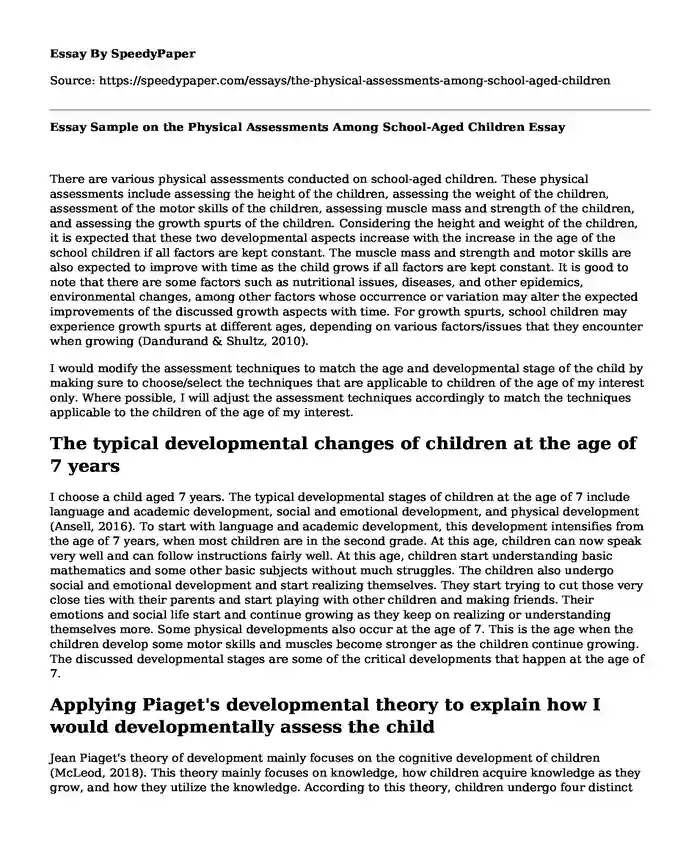
| Type of paper: | Essay |
| Categories: | School Child development Cognitive development |
| Pages: | 3 |
| Wordcount: | 790 words |
There are various physical assessments conducted on school-aged children. These physical assessments include assessing the height of the children, assessing the weight of the children, assessment of the motor skills of the children, assessing muscle mass and strength of the children, and assessing the growth spurts of the children. Considering the height and weight of the children, it is expected that these two developmental aspects increase with the increase in the age of the school children if all factors are kept constant. The muscle mass and strength and motor skills are also expected to improve with time as the child grows if all factors are kept constant. It is good to note that there are some factors such as nutritional issues, diseases, and other epidemics, environmental changes, among other factors whose occurrence or variation may alter the expected improvements of the discussed growth aspects with time. For growth spurts, school children may experience growth spurts at different ages, depending on various factors/issues that they encounter when growing (Dandurand & Shultz, 2010).
I would modify the assessment techniques to match the age and developmental stage of the child by making sure to choose/select the techniques that are applicable to children of the age of my interest only. Where possible, I will adjust the assessment techniques accordingly to match the techniques applicable to the children of the age of my interest.
The typical developmental changes of children at the age of 7 years
I choose a child aged 7 years. The typical developmental stages of children at the age of 7 include language and academic development, social and emotional development, and physical development (Ansell, 2016). To start with language and academic development, this development intensifies from the age of 7 years, when most children are in the second grade. At this age, children can now speak very well and can follow instructions fairly well. At this age, children start understanding basic mathematics and some other basic subjects without much struggles. The children also undergo social and emotional development and start realizing themselves. They start trying to cut those very close ties with their parents and start playing with other children and making friends. Their emotions and social life start and continue growing as they keep on realizing or understanding themselves more. Some physical developments also occur at the age of 7. This is the age when the children develop some motor skills and muscles become stronger as the children continue growing. The discussed developmental stages are some of the critical developments that happen at the age of 7.
Applying Piaget's developmental theory to explain how I would developmentally assess the child
Jean Piaget's theory of development mainly focuses on the cognitive development of children (McLeod, 2018). This theory mainly focuses on knowledge, how children acquire knowledge as they grow, and how they utilize the knowledge. According to this theory, children undergo four distinct developmental stages which are sensorimotor stage which occurs at the age of 0 to 2 years, the preoperational stage which occurs at the age of 2 to 7 years, concrete operational stage which occurs at the age of 7 to 11 years, and formal operations stage which occurs at the age of more than 11 years.
Our selected child, aged 7 years, is in the concrete operational stage of Piaget's theory. This stage is mainly characterized by self-realization, understanding time management, good methodological and logical manipulation of symbols and general information, and understanding the outside world, and various events that happen in the environment/world, among other factors (Ghazi & Ullah, 2016). To developmentally assess the child, I would consider how he/she understands things and reasons on his/her own to solve different issues and problems that he/she faces. This will help me to understand how his/her intelligence is growing. I may also his/her time management skills and other crucial indicators that show that this child is becoming more intelligent as he/she grows. During the assessment, I would offer explanations based on the cognitive development of the child considering the main developmental aspects highlighted by Piaget's theory. The strategies I would use to gain cooperation and potential findings from the assessment are the strategies that analyze the time management skills of children, the strategies that analyze critical thinking, logical reasoning, and interpretation of ideas/issues of children, strategies that address the issue of self-actualization and some independence of children (from parents), among other strategies.
References
Ansell, N. (2016). Children, youth, and development. Routledge.
Dandurand, F., & Shultz, T. R. (2010). Automatic detection and quantification of growth spurts. Behavior research methods, 42(3), 809-823.
Ghazi, S. R., & Ullah, K. (2016). Concrete operational stage of Piaget's cognitive development theory: An implication in learning mathematics. Gomal University Journal of Research, 32(1), 9-20.
McLeod, S. (2018). Jean Piaget's theory of cognitive development. Simply Psychology. https://www.simplypsychology.org/piaget.html
Cite this page
Essay Sample on the Physical Assessments Among School-Aged Children. (2023, May 01). Retrieved from https://speedypaper.net/essays/the-physical-assessments-among-school-aged-children
Request Removal
If you are the original author of this essay and no longer wish to have it published on the SpeedyPaper website, please click below to request its removal:
- Essay Example on Communication of Emotions
- Free Essay Sample on the Rocky Horror Show
- Comparison Essay Sample: The Letter from Birmingham Jail and Sophocle's Play
- Generalized Anxiety Disorders. Essay Example
- Essay Sample on Evidence-Based Strategies for Preventing Seclusion and Restraint
- Essay Sample on Full Practice Authority Nurses
- Essay Sample on Consumer Behavior Change
Popular categories




